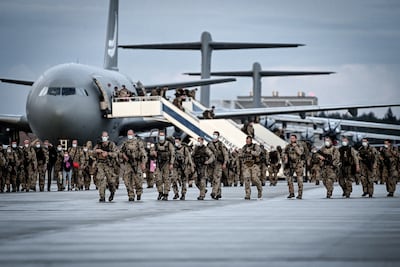Western intelligence was in the dark about the state of the Afghan army as it collapsed in the face of the Taliban advance, an inquiry has heard.
Nato forces did not know how much the Afghans relied on American air power and how damaging its withdrawal would be, a German military aide said.
The testimony sheds light on why the US and its allies were caught by surprise when the Taliban swiftly took over the country.
The militants captured a string of provincial cities before entering Kabul on August 15 last year, before Nato powers had finished withdrawing.
Speaking anonymously to a closed-door parliamentary inquiry, the German defence ministry analyst said the army had limited knowledge of what was unfolding in areas conquered by the Taliban.
Although defence chiefs were in regular contact with intelligence services, everyone involved with the operation was surprised by the lightning pace of the Taliban’s advance, the inquiry heard.
By the end of the Nato operation, intelligence was limited to what troops could see with their own eyes while on patrols near their camp, the witness said.
“Collecting information from the various parts of Afghanistan became ever more difficult as Afghan forces steadily retreated,” according to a written summary of their testimony.
“There was initially not enough information on how much Afghan forces relied on the US military to make a suitable assessment of the resilience of the Afghan security forces.”
The aide said Afghan forces lost motivation after the US announced its planned withdrawal in February 2020, under a deal between the Taliban and former president Donald Trump’s administration.
Until then, Afghan forces believed they would continue to have American backing, but the deal signed in Doha was described to the committee as a signal to the Taliban that the government was losing western backing.
President Joe Biden inherited the deal and opted to complete the withdrawal rather than resume fighting when a ceasefire expired, leading to heavy criticism when the US-backed government collapsed.

Mr Biden said Afghan forces had lacked the will to fight for their country. Former German chancellor Angela Merkel said they had not been expected to lay down their arms so quickly.
By August 2021, the Taliban had taken over so many areas of the country that government forces “had no more room for manoeuvre,” the German inquiry was told.
The Taliban had committed under the US deal to negotiate with the Afghan government on a ceasefire and future political road map.
However, by last summer their promises of negotiations “were already no more than a charade”, the German witness said.
The capture of Kabul was followed by a hectic two-week evacuation as Britain, Germany and others scrambled to get their troops, diplomats and Afghan support staff out of the country.
The 12-member German committee is tasked with examining the final phase of the war in Afghanistan and whether Germany could have prepared better for the withdrawal and evacuation.
A separate inquiry will examine the wider sweep of the 20-year mission in Afghanistan. Germany deployed 93,000 troops, of whom 59 died, in its biggest military intervention since the Second World War.
"I strongly believe that we should reflect on what went wrong in Afghanistan," Foreign Minister Annalena Baerbock told a peace forum in Berlin this week.


